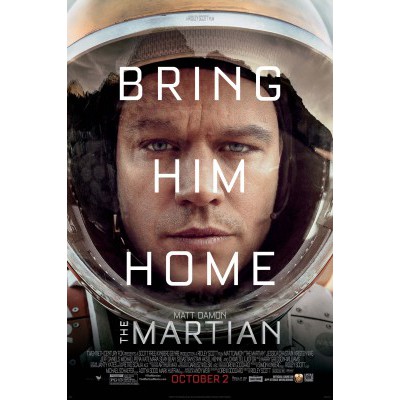LGM at the Movies: The Martian

I don’t go to many movies these days, so it takes a combination of factors to pull me into a theater. The Martian managed to do so by combining a genre I like, with a director who produced two of the best films in that genre, with a lead actor who is often in good films, all combined with almost uniformly strong reviews.
This post is an expression of genuine perplexity. I thought The Martian was a really bad movie.
It’s as if Ridley Scott took the last two minutes of the original version of Blade Runner — the preposterous happy ending that he was supposedly forced to tack onto the movie by the studio — and blew it up into a two and a half hour gazillion dollar exercise in box office cynicism. The movie is a kind of endlessly extended version of one of those corporate advertisements that features a relentlessly cheerful and exquisitely multi-cultural cast, whose point is to give the viewer the vague feeling that MegaCorp Inc. is all about making the world a better place as opposed to maximizing shareholder value.
The Martian doesn’t feature any actual Martians, but it also doesn’t contain any recognizable human beings. The characters here make Star Wars look like a Bergmanesque foray into psychological realism: the closest the movie comes to gesturing towards any kind of complexity is when the head of NASA says a couple of things that might be interpreted as questioning whether it makes sense to spend untold sums to launch a likely-to-fail mission to rescue one person. Any risk that the film might veer into the gravitational field of even an extremely distant reality is soon quashed, and we’re back to the equivalent of a Coke commercial with very expensive special effects.
One special effect Scott omits is anything beyond the bare outline of the paint by number plot that would get a viewer to care about the fate of Matt Damon’s character. Here is the sum total of what we learn about him (spoiler alert): he’s a botanist, he hates disco music, and he loves his parents. Of course he’s also incredibly resourceful and blandly heroic, but these are not so much revelations as pure generic conventions, that could spew from the MacBook of the laziest Hollywood hack, and apparently did.
Per Rotten Tomatoes, the critical consensus regarding The Martian is that it’s “surprisingly funny,” which is true if you find jokes about how science nerds are clumsy and disco music sucks funny, as opposed to excruciatingly hackneyed.
The only interesting thing about this movie is the question of why it’s getting so much critical praise. That the 77-year-old Scott seems to be completely out of ideas is sad but predictable, as is the fact that he’s now the kind of director that a studio can trust with a gigantic budget, knowing that he’ll boil the necessary pots to “win” the box office battles.
In The Invisible Bridge Rick Perlstein suggests that the sudden renewed popularity of Horatio Alger novels in the wake of the Watergate indicated a longing in the public for the supposed verities of a supposedly simpler more innocent time, and that this same desire eventually helped get Ronald Reagan elected. Perhaps a similar explanation helps account for why, at the height of the new gilded age, The Martian is being praised to the skies.


